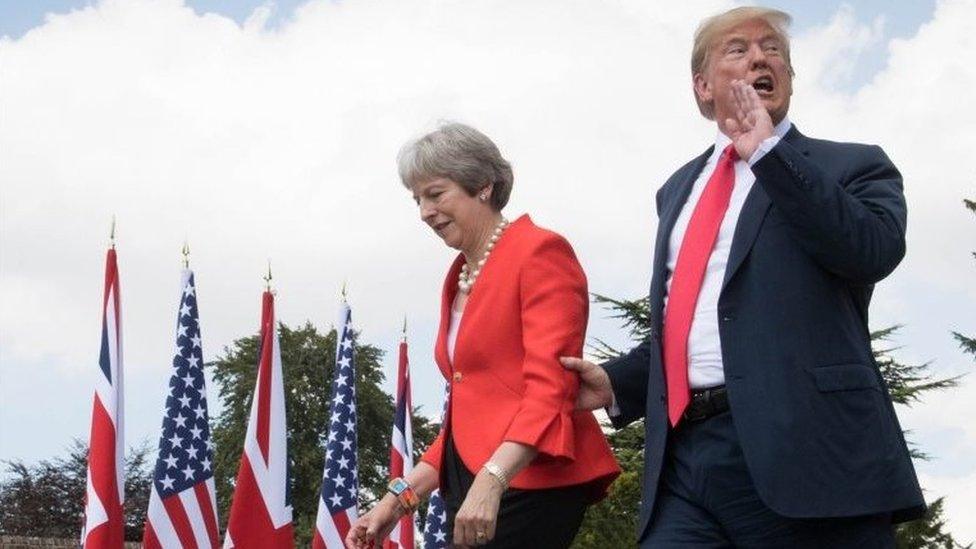Donald Trump joins Queen for 75th D-Day anniversary
- Published
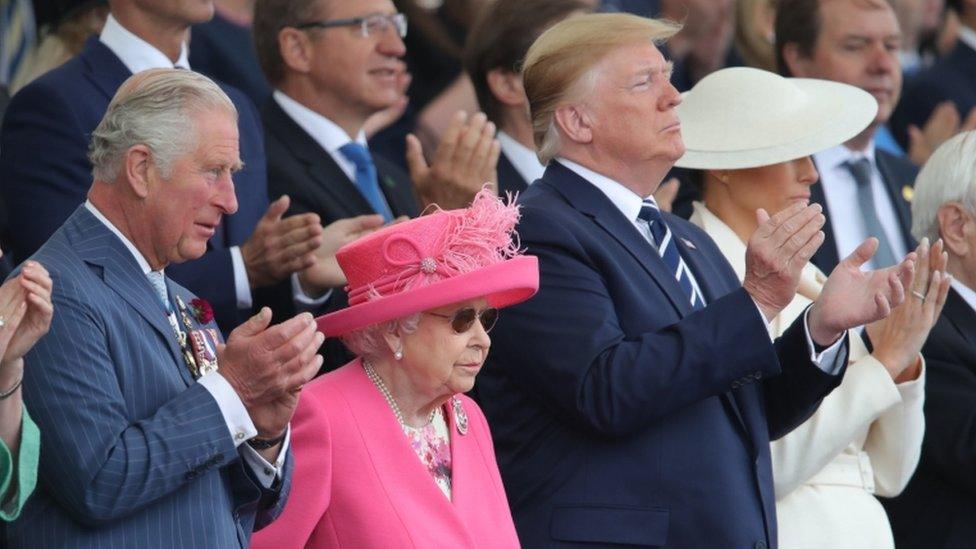
World leaders, including US President Donald Trump, have joined the Queen in Portsmouth to commemorate the 75th anniversary of the D-Day landings.
Theresa May is hosting 15 world leaders to honour the largest combined land, air and naval operation in history.
Figures from every country that fought alongside the UK are attending.
Coming to the end of a three-day state visit to the UK, Mr Trump said he was looking forward to marking what "may have been the greatest battle ever".
The countries represented at the event have agreed to make a joint statement pledging to ensure the "unimaginable horror" of World War Two is not repeated.
Called "the D-Day proclamation", the 16 signatories - including the UK and the US - will commit to working together to "resolve international tensions peacefully".
The UK prime minister will use the occasion to call for continued Western unity in tackling what she will call "new and evolving security threats".
On Thursday, memorial services are planned to mark the 75 years since the D-Day landings on 6 June 1944 - the start of the campaign to liberate Nazi-occupied north-west Europe.

Veterans went on stage to be honoured by the audience
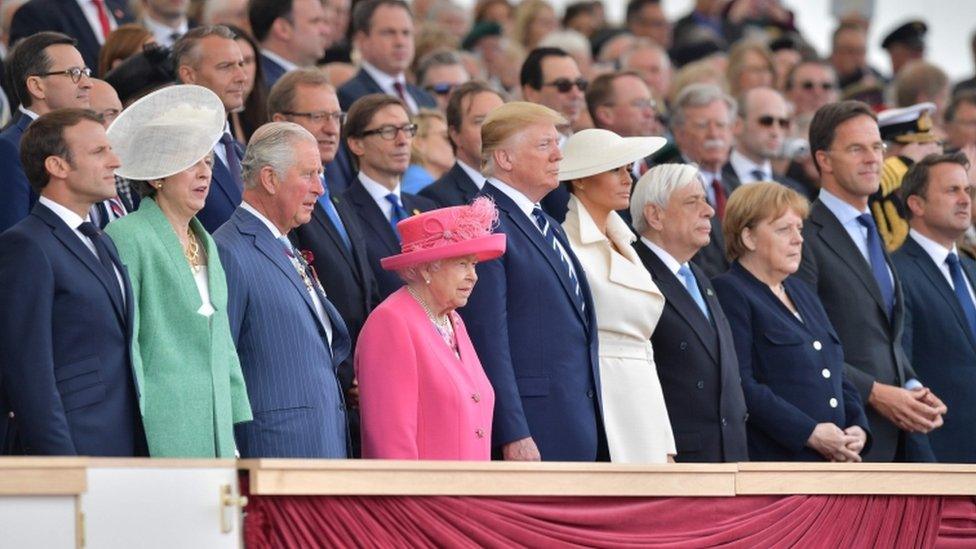
Mrs May, Prince Charles, the Queen and Mr Trump stood for the UK national anthem
The Queen and the Prince of Wales attended the commemorations on Southsea Common, along with representatives from the countries that fought alongside the UK in the Battle of Normandy including French President Emmanuel Macron, US President Donald Trump and Canadian Prime Minister Justin Trudeau.
Also attending were German Chancellor Angela Merkel, as well as leaders from Australia, Belgium, Czech Republic, Denmark, Greece, Luxembourg, the Netherlands, Norway, New Zealand, Poland and Slovakia.
Veterans saluted the crowd, actor Sheridan Smith performed a Dame Vera Lynn song, and Mr Trump read the same prayer read by President Roosevelt during a radio message ahead of the D-Day landings.
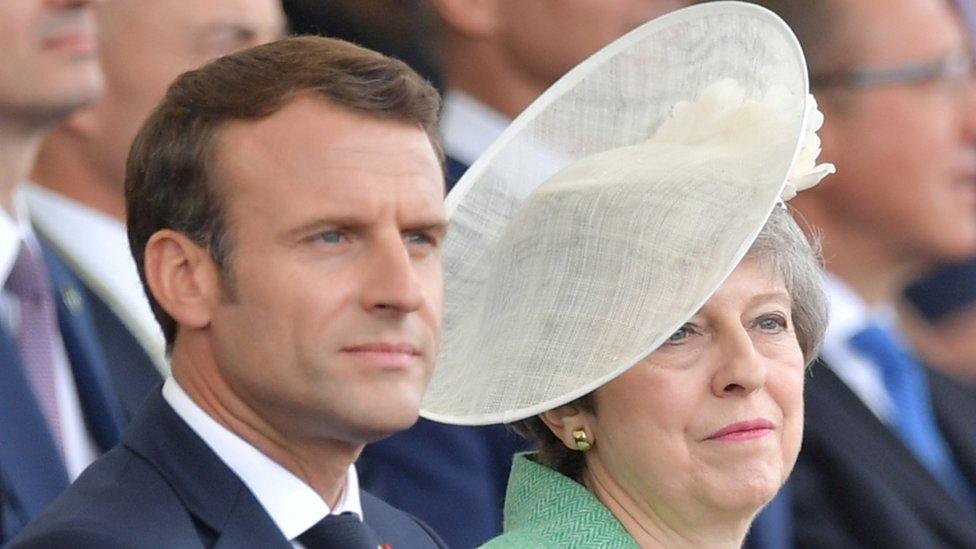
The event marks Mrs May's last official engagement as prime minister
The Queen told the crowd she was "delighted" to be at the event to thank veterans for their service.
She added: "When I attended the commemoration of the 60th anniversary of the D-Day landings, some thought it might be the last such event.
"But the wartime generation, my generation, is resilient."
Members of the armed forces and more than 300 veterans, who are all over 90 years old, also attended the event in Portsmouth - one of the key embarkation points on D-Day.
Hundreds of other veterans are in northern France to mark the occasion.
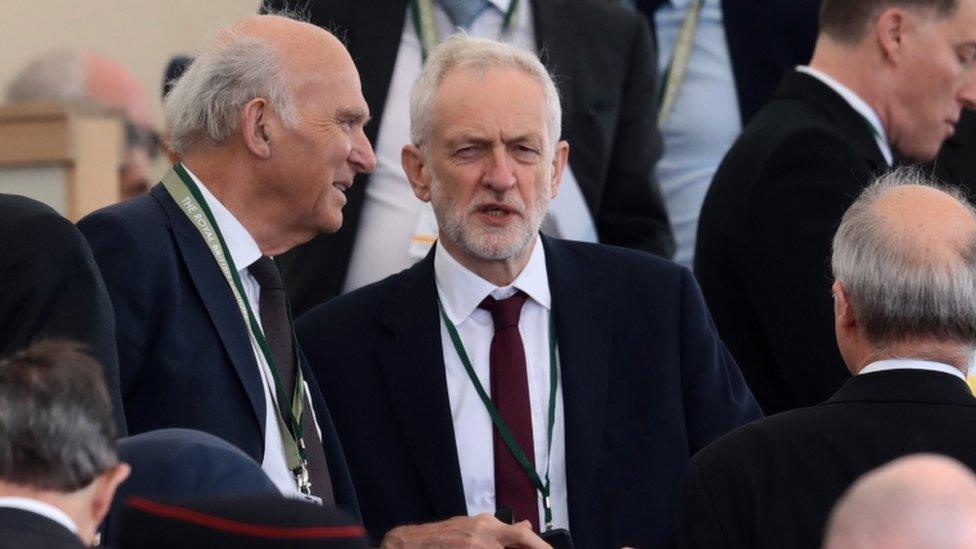
Liberal Democrat leader Sir Vince Cable and Labour leader Jeremy Corbyn attended the D-Day event after boycotting a state banquet held for the Trumps on Monday
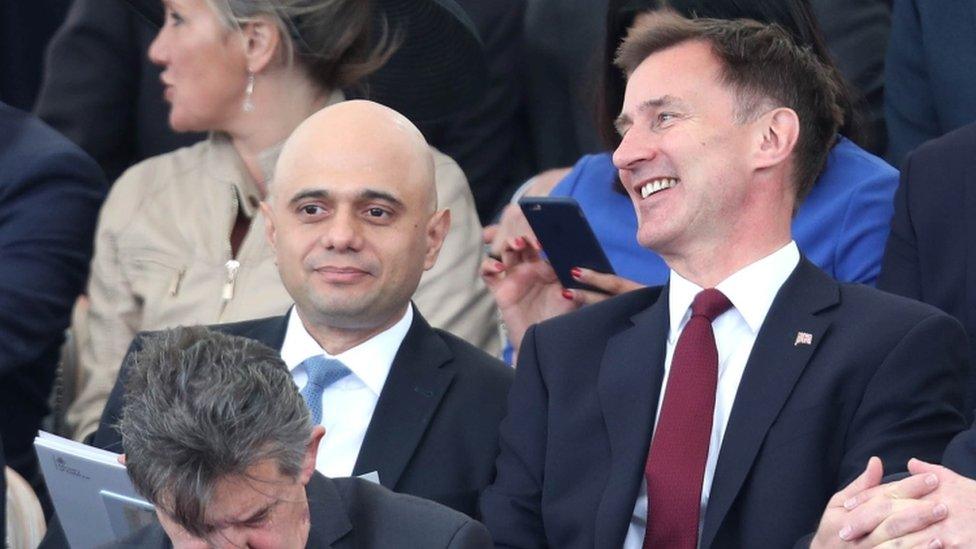
Tory leadership rivals Home Secretary Sajid Javid and Foreign Secretary Jeremy Hunt share a joke
Thousands of members of the public watched the event on big screens on Southsea Common, separated from the VIPs and veterans by a large security fence.
A designated protest area was set up in Guildhall Square, more than a mile (1.6km) from the Southsea Common events.
Civic leaders were worried protests near the main event could upset veterans.
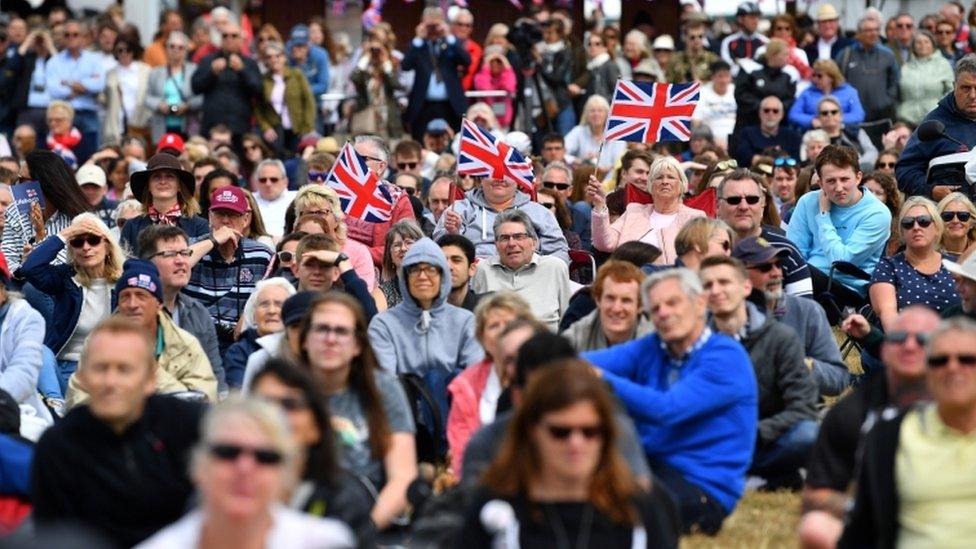
Members of the public sat on Southsea Common to watch the event
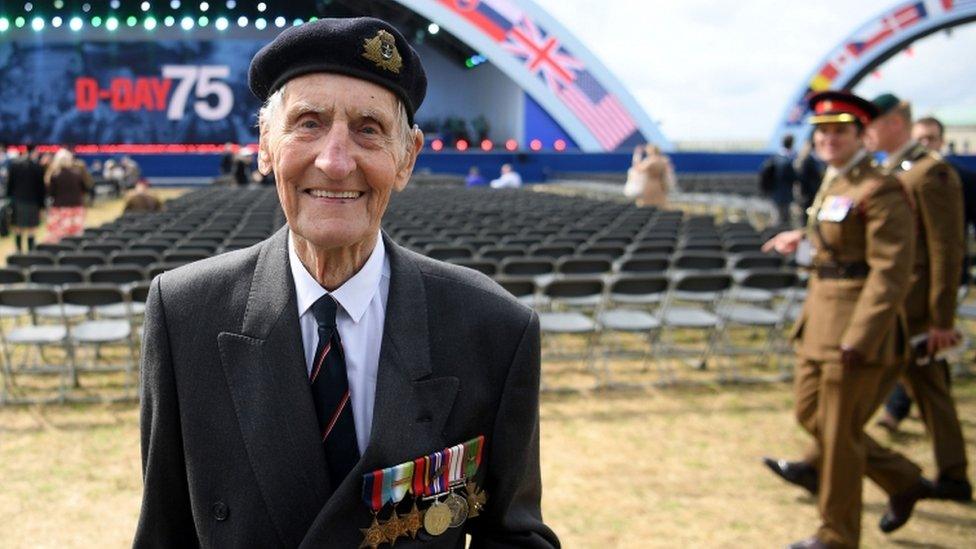
On D-Day, Jim Booth, now 97, climbed into a fold-up canoe and shone a beacon out to sea to guide allied craft safely to shore
The event included a flypast of the Red Arrows.
A reception with veterans will be followed by world leaders meeting to discuss the western alliance and security.
Later in the afternoon veterans Harry Read, 95, and John Hutton, 94, will parachute into Normandy in honour of their lost comrades.
The last time the UK hosted this many world leaders outside a formal summit was the 2012 Olympics.
156,000allied troops landed in Normandy, across
5 beaches
7,000ships and landing craft involved and 10,000 vehicles
4,400from the combined allied forces died on the day
4,000 - 9,000German casualties
Thousandsof French civilians also died
The commemorations to mark the Allied invasion of northern France come a day after Mr Trump had a series of political meetings as part of his three-day state visit to the UK.
The president used a TV interview to play down his earlier suggestion that the NHS would be included in post-Brexit trade talks between the US and the UK.
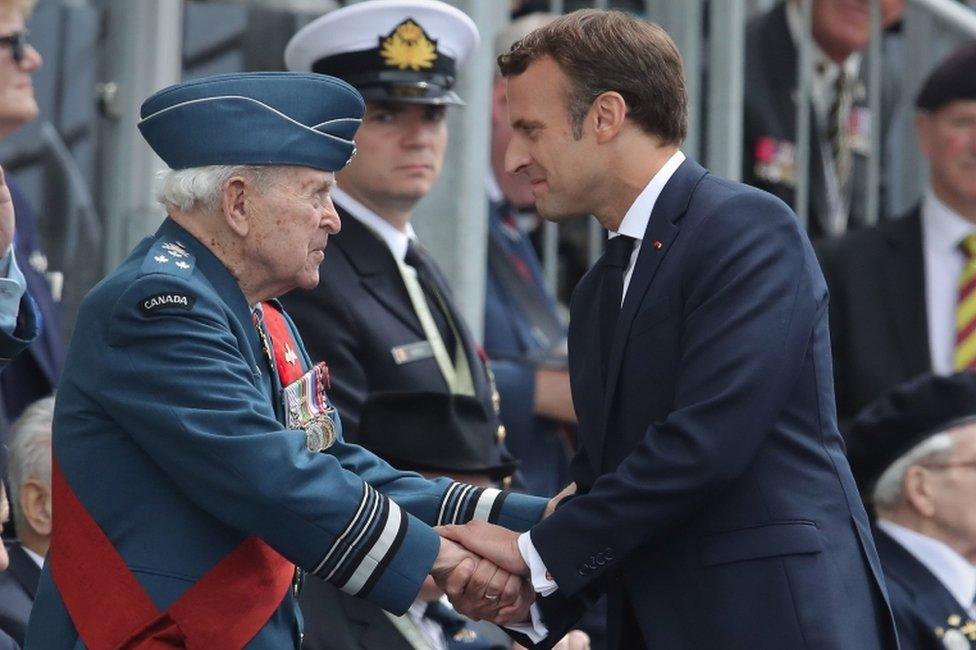
French President Emmanuel Macron met veterans after taking to the stage to read a letter from an executed French Resistance fighter
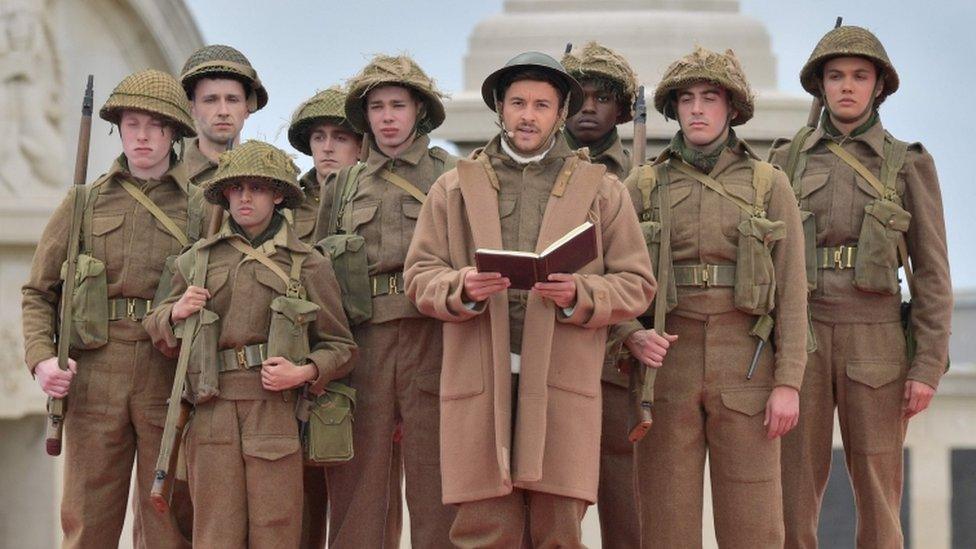
The memories of a Royal Navy electrician R G Watts, as he left Southampton to Normandy in June 1944, were read to the crowd
During a joint news conference with the UK prime minister, Mr Trump had said "everything is on the table" in future discussions between the countries.
But Mr Trump told Piers Morgan in an interview for ITV's Good Morning Britain that he did not "see it being on the table".
"I said everything's up for negotiation because everything is, but I don't see that being... that's something that I would not consider part of trade. That's not trade," he said.
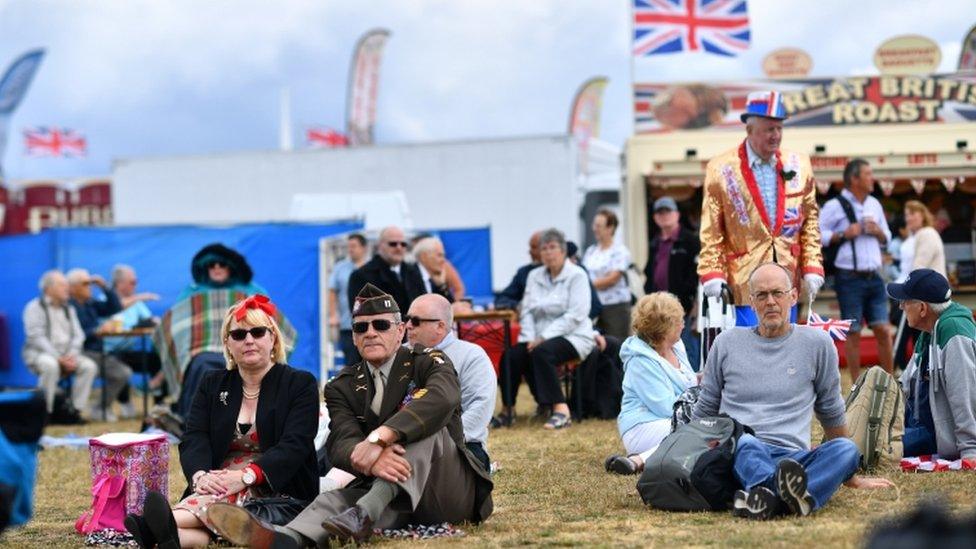
Some 60,000 members of the public are expected to turn out
Other things Mr Trump said in the ITV interview were:
People who fought on D-Day paid the "ultimate debt". "That may have been the greatest battle ever in history," he said. "Being at that site [Portsmouth] will be very interesting"
He would have "no problem" with meeting Jeremy Corbyn another time after earlier revealing he had turned down a request to meet the Labour leader
He had a long conversation with Prince Charles about climate change - referred to as "extreme weather" by Mr Trump - and was impressed with the prince's "passion" for future generations
He clarified that he had called the Duchess of Sussex's comments about him "nasty", rather than calling her nasty
His mother "would have been very proud" to see him meet the Queen
"There's always a chance" he might take military action in Iran, but he does not want to. "I'd much rather talk [to Iranian President Hassan Rouhani]"
On having the nuclear codes - "I think it's a terrible responsibility but it's a responsibility I'm prepared to handle"
On his ban on transgender people serving in the army - "It is what it is," he said. "They take massive amounts of drugs, they have to... You would have to break rules and regulations in order to have that"
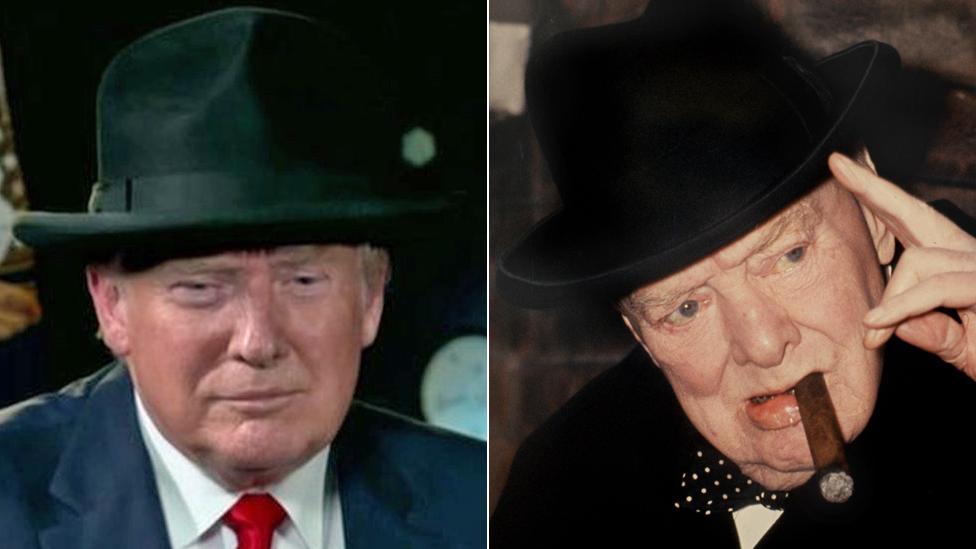
Mr Trump was given a Winston Churchill-style hat as a present. He said he hoped he had "similarities" with the wartime prime minister, pictured right
Tuesday saw protesters gathered in central London and other cities - including Glasgow, Edinburgh and Sheffield - to voice their opposition to President Trump's visit.
Mr Corbyn - who boycotted Monday evening's state dinner - was joined at the London rally by members of other political parties, including the Liberal Democrats and the Green Party.

Trump and what comes next

For any prime minister, handling a president like Donald Trump is like trying to hold on to a Ming vase walking across a recently polished, slippery parquet floor.
He's a leader who glories in the unpredictable, who seems to wake up every morning wondering what controversy he can provoke, what headlines he can create.
His reason for being is therefore from the start in contrast with the stiff choreography of a state visit.
But No 10 will be relieved that the formalities with the PM were free of mishap. And, as Theresa May readies herself for the exit, Donald Trump, who has definitely embarrassed her in the past, didn't repeat that habit.

In a Tweet posted on Wednesday, external, Mr Trump said the "massive" rallies he had been told to expect were "flops".
"The big crowds, which the Corrupt Media hates to show, were those that gathered in support of the USA and me," he added.
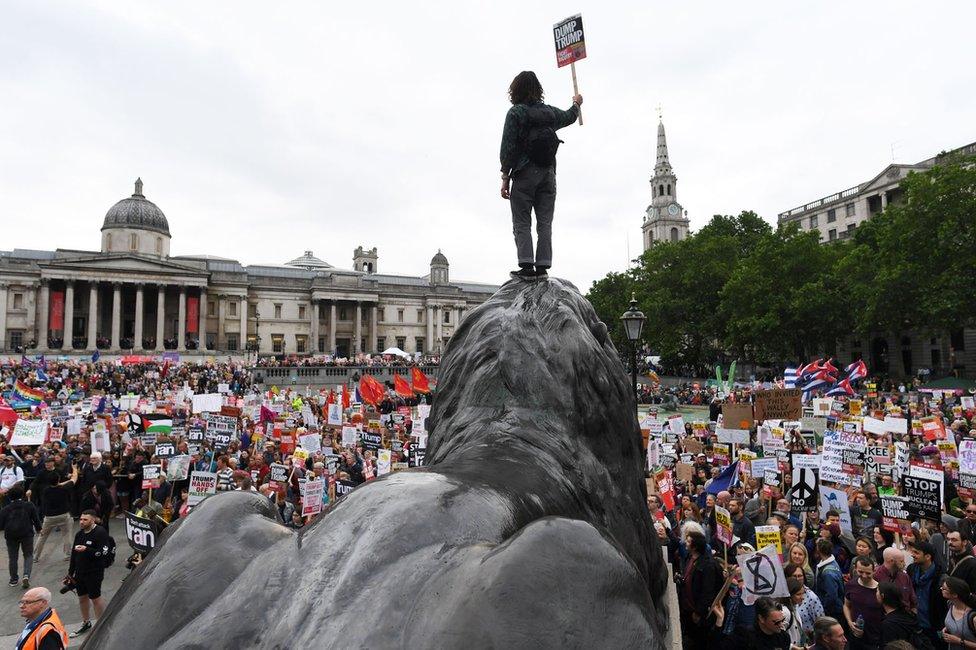
A protest against the state visit started in Trafalgar Square
He also said he "could not have been treated more warmly" by people in the UK.
Allow X content?
This article contains content provided by X. We ask for your permission before anything is loaded, as they may be using cookies and other technologies. You may want to read X’s cookie policy, external and privacy policy, external before accepting. To view this content choose ‘accept and continue’.

The US president was expected to meet Tory leadership hopeful Michael Gove before his first official engagement in Portsmouth.
The president has already had a phone conversation with fellow candidate Boris Johnson, and had a one-to-one chat with contender Jeremy Hunt during a banquet at the US ambassador's residence on Tuesday evening.
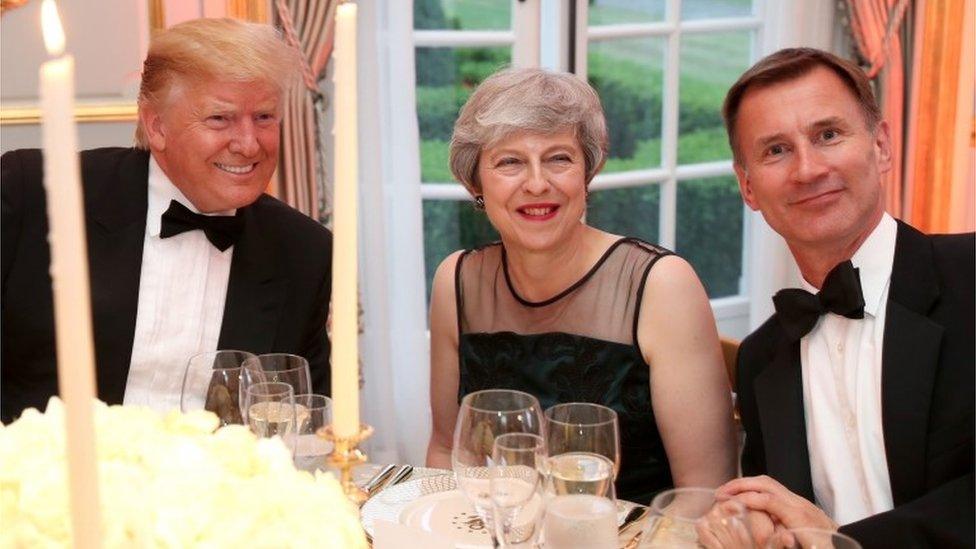
Mr Trump, Mrs May and Jeremy Hunt ate beef fillet and heritage tomatoes at the US ambassador's residence
Following the commemorations in Portsmouth, Mr Trump will fly to Shannon for his first visit to the Republic of Ireland as US president.
He will then hold a meeting with the Irish prime minister Leo Varadkar before he goes to his golf resort in Doonbeg.
- Published5 June 2019
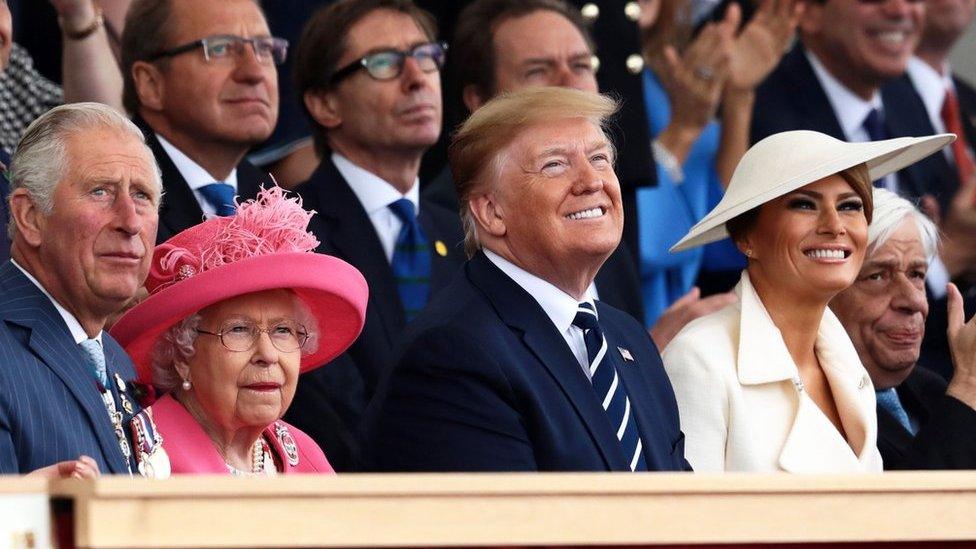
- Published4 June 2019
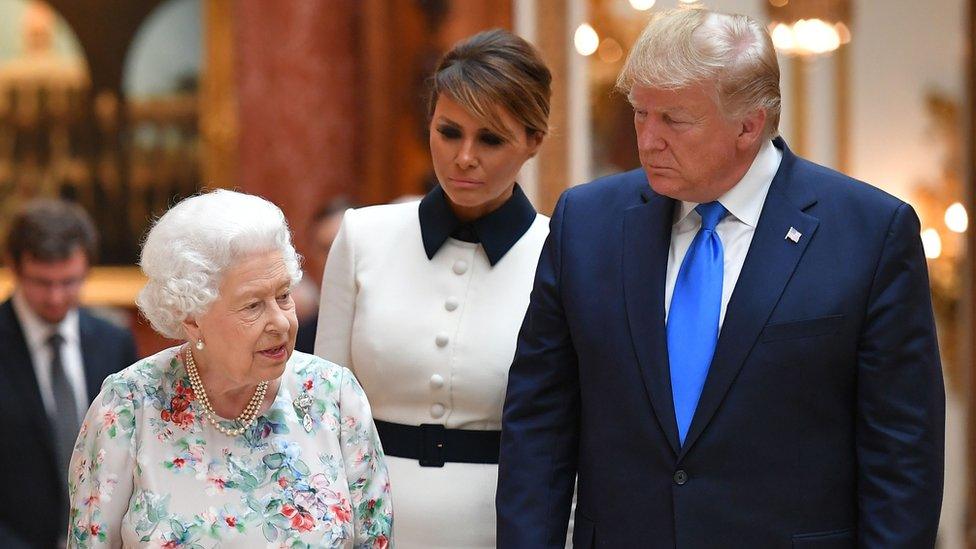
- Published4 February 2019
